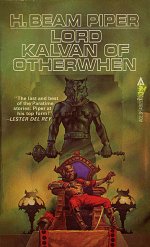
Lord Kalvan of Otherwhen
H. Beam Piper
215 pages
published in 1965
H. Beam Piper might be the ultimate example of why you should not take your chosen political philosophy too seriously, as he, a staunch libertarian comitted suicide when unable to pay his debts rather than ask for help. He died believing he was a failure as a science fiction writer, when he actually had multiple sales just before his death, but had not yet been notified of them (due to the unfortunate death of his agent). Since his belief system left no room for charity, let alone "handouts" from the state, he shot himself to avoid being a burden.
Lord Kalvan of Otherwhen was one of the already sold but not yet published works; it only came out after his death. It is heartbreaking to think that the writer of this fine novel was already dead at the time of first publication, even more so if you allow yourself to think about what might have been. Even now, H. Beam Piper is a writer with a fanatical cult following; if he had lived he could've been one of science fiction's most important writers and popular writers. Instead, we have to make do with several excellent novels and short stories, as well as a bunch more merely good novels and stories. Lord Kalvan of Otherwhen stands in testimony of what might have been.
Lord Kalvan of Otherwhen is part of Piper's Paratime Police series, though it can easily be read on its own. The Paratime Police come from a timeline where a way was discovered to move to alternate Earths, which they then used or plundered to provide their own Earth with the goods to survive. By the time of Lord Kalvan of Otherwhen, a vast paratime empire has been created, with thousands upon millions of paratimers moving amongst the timelines at any one point. And as with any sort of transport, accidents happen...
Which is where Calvin Morrison, Pennsylvania state trooper comes in. During an arrest of an escaped convict, a paratime machine accidently picks him up and deposits him on a timeline far, far away from his own. Which might be the best thing that ever happened to him --if he can survive.
And the Earth he lands on is far different from that he left behind. Not for Piper the timid cunterfactual of Hitler winning World War II, the South winning the American Civil War or something equally dreary. No, the divergence point for this Earth lies much further in the past, with the invasion of the Aryan tribes of India, the Middle East and Europe, which here did not happen; instead, they went into what should be China and some even further, to what would be America. This America is divided into various kingdoms and principalities, most of which are nominally part of some overkingdom or other, but largely independent in practise. Technology is roughly equivalent to that of 17th century Europe, though slightly retarded.
Calvin lands in the middle of one of those little princedoms, in what in his world was one of Pennsylvania's counties and proves his metal when he manages to foil a raid by its enemies. This princedom, Hostigos, is an unhappy one, at war with a neighbouring kingdom, Nostor and embargoed by the priests of Styphon, the only people who know how to make gunpowder and exploiting their power mercilessly. The only ones that is, until Calvin landed on this world...
Calvin quickly becomes Lord Kalvan, the prince of Hostigos' right hand as well as the lover of his daughter, Rylla. They all realise that while they now have afighting chance by being able to produce their own gunpowder, their real enemy now are the priests of Styphon, much more formidable than their old Nostor enemy ever was...
I had read Lord Kalvan of Otherwhen for the first times some years ago and decided to reread it this time as a comfort read, something you know of how it ends, but still enjoy. What struck me in rereading was how well written this was, something I did not expect. The writing in this subgenre is too often godawful, but here sparkled. It was a pleasure to read not just for the (somewhat wish fulfilment) plot, but also for the way Piper writes.
Also impressive was the world H. Beam Piper sketched here, combining real world elements with original touches to create an entirely new, yet believable world. The people on Calvin's new world are pagans, but not followers of any gods we know, yet the gods we see seem to fulfil the same archetypes as e.g. the Norse gods did. The tech level feels like early 17th century Europe, but has evolved in different ways. The traditions and beliefs of the people feel familiar, but are no the same as you'd expect in our world.
Much of Lord Kalvan of Otherwhen is of course devoted to the battles Calvin/Kalvan and Hostigos have to fight for their survival and the descriptions of those battles rank amongst the best I've read in fantasy or science fiction, including the confusion and mistakes that are made on any battlefield. Even with the outcome largely known, these were still exciting.
Finally, there were the characters. Calvin/Kalvan himself is the sort of hero who could've been one of science fiction's archetypes, if Piper had not committed suicide, but the other characters are each believable and well rounded. Even the main villain, the high priest of Styphon is more than cardboard, in his realisation that it is impossible to put the genie in a bottle, but at least he can attempt to limit the damage and postpone the fall of Styphon House until after his death....
Put all this together and you have a classic, which deserves wider recognition. Highly recommended.
